
The Chicago Police Department (CPD) is the municipal law enforcement agency of the city of Chicago, Illinois, United States, under the jurisdiction of the Chicago City Council. It is the second-largest municipal police department in the United States, behind the New York City Police Department. CPD currently has 11,710 sworn officers on duty, and over 1,925 other employees. Tracing its roots back to the year of 1835, the Chicago Police Department is one of the oldest modern police departments in the world.
Special police usually describes a police force or unit within a police force whose duties and responsibilities are significantly different from other forces in the same country or from other police in the same force, although there is no consistent international definition. A special constable, in most cases, is not a member of a special police forces (SPF); in countries in the Commonwealth of Nations and often elsewhere, a special constable is a voluntary or part-time member of a national or local police force or a person involved in law enforcement who is not a police officer but has some of the powers of a police officer.
In law enforcement in the United States, a gypsy cop, also known as a wandering police officer, is a police officer who frequently transfers between police departments, having a record of misconduct or unsuitable job performance. The term is slang, referencing the stereotypical nomadic lifestyle of the Romani people, pejoratively "Gypsies".
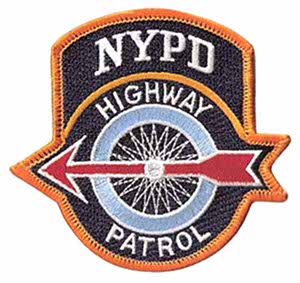
The Highway Patrol are specialized units part of the Highway District with the Transportation Bureau of the New York City Police Department. The Highway Patrol is primarily responsible for patrolling and maintaining traffic safety on limited-access highways within New York City. The Highway Patrol's other duties and roles include accident investigations, advanced driver and radar/laser speed enforcement training for NYPD officers, field sobriety testing at the various testing locations in each Patrol Borough, dignitary and parade escorts, hazardous material and truck traffic enforcement, anti-drag racing programs, and anti-terrorist checkpoints at key bridges and intersections in the city.
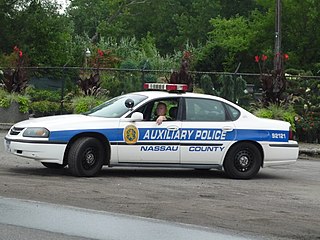
Auxiliary police, also called volunteer police, reserve police, assistant police, civil guards, or special police, are usually the part-time reserves of a regular police force. They may be unpaid volunteers or paid members of the police service with which they are affiliated.
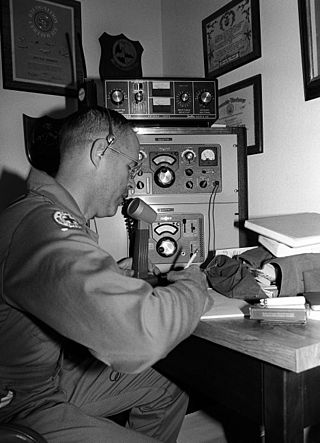
Auxiliaries are support personnel that assist the military or police but are organised differently from regular forces. Auxiliary may be military volunteers undertaking support functions or performing certain duties such as garrison troops, usually on a part-time basis. Unlike a military reserve force, an auxiliary force does not necessarily have the same degree of training or ranking structure as regular soldiers, and it may or may not be integrated into a fighting force. Some auxiliaries, however, are militias composed of former active duty military personnel and actually have better training and combat experience than their regular counterparts.

The New York City Police Department Auxiliary Police is a volunteer reserve police force which is a subdivision of the Patrol Services Bureau of the New York City Police Department. Auxiliary Police Officers assist the NYPD with uniformed patrols, providing traffic control, crowd control, and other services during major events.
Police misconduct refers to inappropriate conduct and illegal actions taken by police officers in connection with their official duties. Types of misconduct include among others: coerced false confession, intimidation, false arrest, false imprisonment, falsification of evidence, spoliation of evidence, police perjury, witness tampering, police brutality, police corruption, racial profiling, unwarranted surveillance, unwarranted searches, and unwarranted seizure of property.

Law enforcement in the United States is one of three major components of the criminal justice system of the United States, along with courts and corrections. Although each component operates semi-independently, the three collectively form a chain leading from an investigation of suspected criminal activity to the administration of criminal punishment.

The Colorado Rangers Law Enforcement Shared Reserve is a governmental police agency in the U.S. state of Colorado. Colorado Rangers are sworn, Colorado P.O.S.T. Certified police officers who serve as force multipliers for law enforcement agencies throughout the state of Colorado. The agency is designed to allow law enforcement agencies to reduce duplicated costs for training, equipment, and deployment of police officers by sharing sworn officers by police agencies throughout the state.
Company police, also called private police, are privately paid law enforcement officers who work for private security companies or private military companies rather than a municipal, county, state, or national agency.
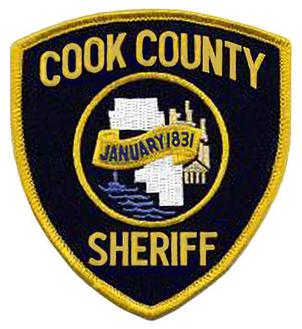
The Cook County Sheriff's Office is the principal law enforcement agency that serves Cook County, Illinois. It is the second largest sheriff's department in the United States, with over 6,900 members when at full operational strength. It is headed by the Cook County Sheriff, currently Thomas Dart.
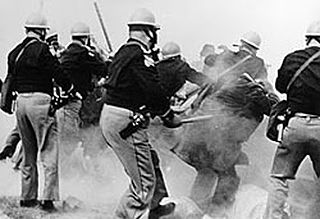
Police brutality is the repression by personnel affiliated with law enforcement when dealing with suspects and civilians. The term is also applied to abuses by "corrections" personnel in municipal, state, and federal prison camps, including military prisons.
A special constable or special police constable can refer to an auxiliary or part-time law enforcement officer or a person who is granted certain (special) police powers.

The Metra Police Department was created to protect the eleven rail lines and 242 stations in metropolitan Chicago's commuter rail system, Metra. The primary function of the Metra Police Department is to protect Metra passengers, employees, assets, enforce criminal laws, traffic laws and ordinances that directly or indirectly relate to the Metra system. Metra police officers are fully sworn officers just like the officers of any municipal police department, responsible for the safety and security of the Metra system in a six-county service area – Cook, Will, DuPage, Kane, McHenry and Lake counties.
In South Carolina, a State Constable is a law enforcement officer who is either a uniformed or plainclothes law enforcement officer employed by one of the departments of the state government, a retired police officer, or a volunteer reserve police officer. Officers may be variously described as "State Constable", "Special State Constable", "Department of Public Safety (DPS) Special Constable" and "Magistrates' Constable". State Constables are appointed by the Governor of South Carolina, and regulated by the South Carolina Law Enforcement Division.
In the United States, certification and licensure requirements for law enforcement officers vary significantly from state to state. Policing in the United States is highly fragmented, and there are no national minimum standards for licensing police officers in the U.S. Researchers say police are given far more training on use of firearms than on de-escalating provocative situations. On average, US officers spend around 21 weeks training before they are qualified to go on patrol, which is far less than in most other developed countries.
In the United States, use of deadly force by police has been a high-profile and contentious issue. In 2022, 1,096 people were killed by police shootings according to The Washington Post, while according to the "Mapping Police Violence" project, 1,176 people were killed by police in total.

The Cocoa Police Department (CPD) is the primary law enforcement agency for the city of Cocoa, Florida, and is accredited through the state of Florida. The department services approximately 19,000 residents within 15.41 sq miles of the municipality. The department also serves roughly 2,500 daily non-residents who commute to the municipality for employment.
The Florida Criminal Justice Standards & Training Commission (CJSTC), established in 1967 under Florida Statutes, Chapter 943, is a Florida state commission. The Commission's mission is "To ensure that all citizens of Florida are served by criminal justice officers who are ethical, qualified, and well-trained." It is part of the Florida Department of Law Enforcement.











